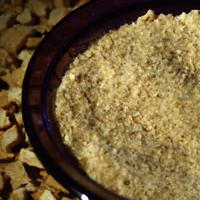
1 serving (28 grams) contains 100 calories, 4.0 grams of protein, 1.0 grams of fat, and 20.0 grams of carbohydrates.

Log this food in SnapCalorie

Nutrition Information
Calories |
400 | ||
|---|---|---|---|
% Daily Value* |
|||
| Total Fat | 4 g | 5% | |
| Saturated Fat | 0.8 g | 4% | |
| Polyunsaturated Fat | 0 g | ||
| Cholesterol | 0 mg | 0% | |
| Sodium | 800 mg | 34% | |
| Total Carbohydrates | 80 g | 29% | |
| Dietary Fiber | 4 g | 14% | |
| Sugars | 8 g | ||
| protein | 16 g | 32% | |
| Vitamin D | 0 mcg | 0% | |
| Calcium | 80 mg | 6% | |
| Iron | 6 mg | 33% | |
| Potassium | 200 mg | 4% | |
* Percent Daily Values are based on a 2,000 calorie diet. Your daily values may be higher or lower depending on your calorie needs.
Food Attributes
Source of Calories
About Dried breadcrumbs
Dried breadcrumbs are a versatile pantry staple made from finely ground, toasted bread. Typically crafted from plain white or whole-grain bread, they often contain minimal ingredients such as flour, yeast, and salt. Popular in many global cuisines, breadcrumbs are used as a coating, thickener, or binder in dishes like schnitzel, meatballs, and casseroles. Originating from resourceful efforts to minimize food waste, breadcrumbs have become a key ingredient in recipes worldwide. Nutritionally, they provide carbohydrates and a small amount of protein, though their healthiness largely depends on the type of bread used; whole-grain breadcrumbs, for example, can offer added fiber and nutrients. However, their low moisture content means they may have a higher calorie density, and seasoned varieties can contain added sodium. When used in moderation and paired with nutrient-dense foods, dried breadcrumbs can enhance texture and flavor in a balanced diet.



